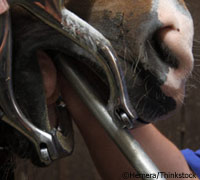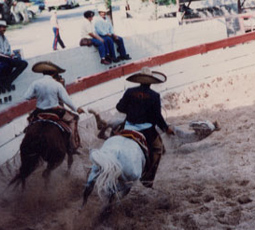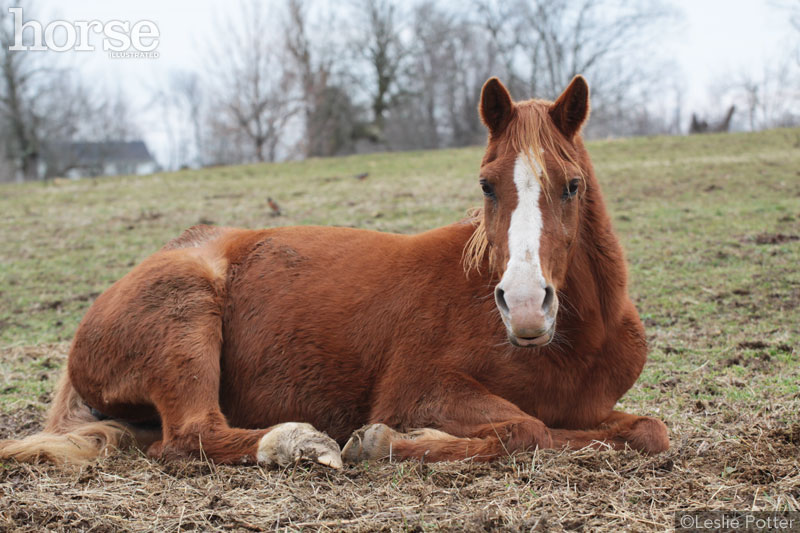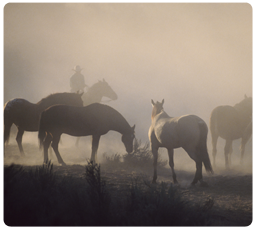 February is National Pet Dental Health Month. As with humans, pets benefit from having
February is National Pet Dental Health Month. As with humans, pets benefit from having
good oral hygiene. Dental disease can lead to pain, tooth loss and infection in other
organs when bacteria from infected teeth and gums enter the blood stream and circulate
throughout the body.
“Regular dental care is important to the well being of today’s horse,” notes Dr. Cleet
Griffin, clinical assistant professor at the Texas A&M College of Veterinary Medicine &
Biomedical Sciences. “Foals and weanlings are examined to check for proper skull and
dental development as well as alignment of upper and lower jaws. This is followed by
routine checkups every six months until about five years old. Once the adult teeth are in
place, annual teeth exams should be performed.”
“Horses have teeth with long crowns that are contained within a deep dental socket.
The teeth continually erupt into the mouth as the grinding surface is worn away,” notes
Griffin.
Horses chew many times per minute when grazing and eating tough, fibrous feed material.
The horse’s teeth slowly wear down when the upper and lower teeth grind one another while
chewing the forage and feed, explains Griffin. After a few minutes of chewing, the food
softens and is able to be swallowed. Not only does eating and chewing gradually wear the
teeth down, but sharp points also develop.
“The horse’s anatomy (the horse’s lower jaw is narrower than its upper jaw) in
combination with the horse’s continual tooth eruption and chewing motion contribute to the
formation of sharp points along the edges of the teeth. Sharp dental points can cause
irritation when the horse is eating or when being ridden because these areas cut and
ulcerate the cheeks and the tongue,” notes Griffin.
Your equine veterinarian will examine your horse’s mouth for odor, inflammation,
ulcers, cuts, tooth decay and abnormalities of wear. Juvenile age performance horses may
require more frequent dental attention to monitor eruption of the permanent cheek teeth
and incisor teeth, explains Griffin.
“To give an equine dental exam, sedation is commonly used. It makes the procedure
safer and easier by providing relaxation and analgesia which helps to keep the horse more
quiet and still, says Griffin. Only a licensed veterinarian should administer a sedative
to your horse. It is also best if he/she can provide the comprehensive dental care,
too.”
A speculum, which is a type of brace, is used to keep the horse’s mouth open during the
exam. The speculum is not painful to the horse when used properly. It facilitates a
better view inside the horse’s mouth and provides a safer working environment for the
veterinarian since motorized floats and specialized dental equipment are now used in
conjunction with manual files, notes Griffin.
Both medication and medical tools are used by your veterinarian to safely remove
‘points’ and ‘hooks’ that could eventually cause discomfort when your horse eats or takes
the bit, explains Griffin. We float (file) the points off the teeth to prevent them from
cutting the cheek tissue or tongue. Also, floating often involves reducing the length of
overlong teeth in order to allow free chewing motion and prevent trauma to opposing dental
tissues. Horse teeth contain sensitive pulp and nerves. When performed properly by the
veterinarian, the floating procedure does not cause harm or pain because great care is
taken not to expose the sensitive tissues of the teeth.
“The horse’s mouth is an efficient food-processing machine. What your horse eats and
where he eats it will affect how your horse’s teeth wear. For example, research has shown
that horses fed a grass or hay diet utilize a greater side-to-side chewing motion, chew
more times per minute and spend more time per day chewing compared to horse that are fed
grain concentrate. With grain concentrate, horses tend to utilize a more ‘up-and-down’
chewing motion which contributes to formation of sharp dental points,” notes Griffin.
A thorough dental examination by a veterinarian can provide important information about
the overall well being of your horse. It is best to detect dental problems early because
it is usually more difficult and costly to correct a later dental crisis. A healthy mouth
that is free from sharp points or painful areas should help your horse chew and perform
more comfortably.
Further Reading
Guidelines for Donkey Dental Care






When your horse gets it’s teeth floated, watch! It’s really interesting!
It really is interesting…..and noisy. 😉
Haven’t needed to do that yet. It’s something I’d be interested in learning how to do.
When I suddenly had horrible spiking pain when I ate certain foods (and not just sweets) I went to the dentist, who had me grind a piece of marking paper in my teeth. It showed that I had spikes from uneven grinding, and *I* needed my teeth floated! Because of this experience, I sympathize a lot more with horses that show mouth pain, having uneven grinding surfaces HURTS! Worse yet, it hurts at seemingly random times, so sometimes you feel the pain, and sometimes you don’t, so you might think your horse is just being bad. Check those teeth out, even if your horse isn’t showing pain all the time!
Great article.